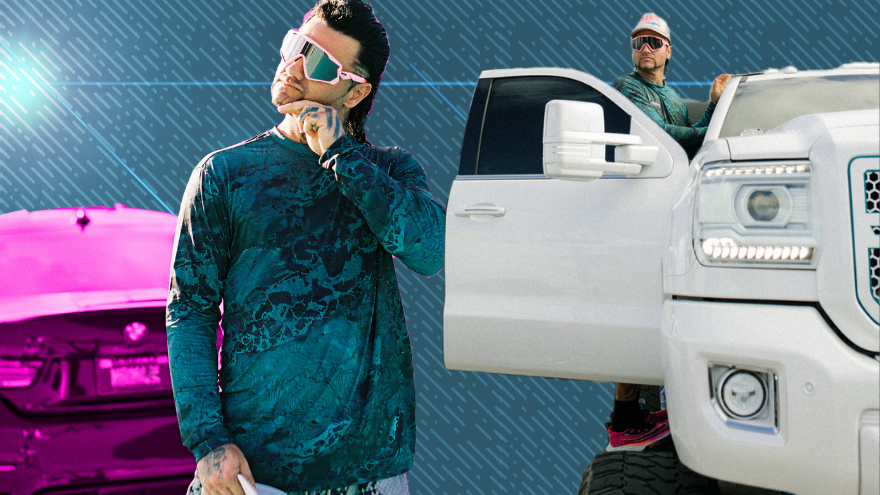I’m walking Riff Raff’s two dogs down the middle of the road in his gated community in south Florida while he’s looking for a video of an unreleased song on his phone. It’s called “Cosmic Wave” from one of his upcoming albums, Sapphire Stallion.
Riff—the eccentric artist, AKA Jody Highroller, AKA Dale Dan Tony, AKA the Peach Panther, AKA the Neon Icon, AKA the Rap Game Bon Jovi—warned me that his dogs might eat other dogs, so I’m doing my best to make sure we don’t cause any damage while I also try not to spill any of the smoothie he made for me. Holly is a 100-pound husky, and Frosty is a little white Shiba Inu that could pass for a lamb. They’re attached by a single neon green leash. Riff’s got a black mullet, pink shorts, bright blue Nikes, and a black long sleeve with an image of himself wearing a cowboy hat.
As soon as he plays the video, a random chick appears on a dirt bike and tries to pop-a-wheelie. I don’t know where she came from, but it makes sense out here on planet Riff Raff. She revs the engine next to us as he sings, “I get lost in your cosmic wave.”
It’s a melancholy pop track—somewhere between the Drive soundtrack, Empire of the Sun, and Billy Idol.
It sounds like his dogs are panting to the beat.
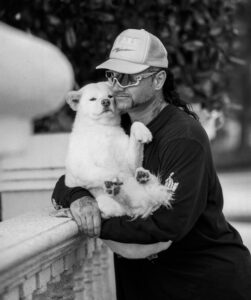
Photograph by Jessica Bellinger
“I can’t perform a song like this without a full band,” Riff says. “Think of the Dick Clark show or American Bandstand. You gotta show people what you got. My live performances will be on point. Everybody wearing suits.”
He’s been talking about putting a band together since I got here four days ago. (Everyone in the band will most likely sport a mullet, too. His manager, Mychael, and his keyboard player, who goes by Synthwave Sensei, also rock committed mullets. These are not afterthought mullets.)
“Everyone thinks they brought back the mullet,” Riff says. “But people owe me that mullet money,” he jokes.
I ask if the comedian Theo Von’s mullet gets a pass. Riff says Theo’s success grants him immunity from owing anyone mullet royalties.
I connected with Riff about a month ago over Twitter after I tweeted that he and Theo Von were two of today’s greatest living poets. By that I mean, they both have a habit of saying sentences that I’m pretty sure have never been spoken before by another human being. After I sent the tweet out, I had some unexpected back and forth with Riff, and now I’m staying in one of his spare bedrooms.
As “Cosmic Wave” plays, Mychael texts us both that I’m going to miss my cab and subsequently my flight home if we don’t get back soon—but Riff keeps playing unreleased songs, and I’d like to hear them all before I leave.
“How many unreleased songs do you have?” I ask.
“Like a hundred,” he says. “There might be another two to three hundred on [Synthwave Sensai’s] computer.”
Over the last few days, I’ve heard the majority of two unreleased Riff Raff albums: Cherry Chupacabra and Sapphire Stallion. Cherry is more rap-centric with songs like “Watermelon Wiseguys” (a personal favorite), but also features songs like “Ain’t Giving Up My Truck” and “Stars in the Roof of My Car.” From what I’ve heard, Sapphire is almost strictly synthwave pop—balancing love songs, heartbreak, and his brand of surrealist wordplay.
We’re running on about two to three hours of sleep. I didn’t get to bed until just after sunrise and was up by 8 a.m. Riff wasn’t up much later than me. We’d spent the night in his home studio going through new beats and watching him record a track.
The song he recorded just before sunrise is one long verse followed by an extremely catchy hook.
There’s one part where he raps, “Your friends thought you made it till you made us land on pavement / you made us land on pavement then I flew off in a spaceship.”
“I felt like Lil Wayne when I wrote that,” he told me after recording it. We’d been talking about work ethic a lot over the weekend, and I related the way I’ve watched Riff work nonstop to what I’d read about Wayne during his Carter III era.
I’ve seen people jump out of moving vehicles to take pictures with Riff. No matter where we go, he’s approached by strangers. And even though he’s had big songs with artists from Katy Perry and Diplo, I don’t think the success he’s achieved is enough for him. It’s all relative, but from what I’ve observed, he’s focused on getting to another level. So, when he raps about flying off in a spaceship, I think he truly sees himself lifting off to a new realm of success. It’s just that he’s been weighing the pros and cons of staying independent versus going with a major label. Like the rest of us, fame or not, we’re up against the algorithms.
“Do you think it’s possible that when you get to that next level, it still won’t be enough?” I ask.
“I don’t know,” he says. “I haven’t been there yet. But I’ll probably make even better music when I do get there… I can’t complain though, you know what I mean?”
“What does success look like to you then?” I ask.
“Success is going platinum,” he says.
“Have you not had a platinum record?” I ask, surprised.
He said the Katy Perry song, “This is How We Do,” went platinum but because it was a remix, he didn’t get any of those plaques.
“Is music the goal or do you want to get into TV?” I ask, thinking about all the projects I’ve heard him discuss this weekend. Plus, he’s got MTV tattooed across the side of his neck. TV seems like it’s still a medium he wants to conquer. (One of his first big breaks was on the MTV reality show, From G’s to Gents.)
“Money is always the goal,” he says.
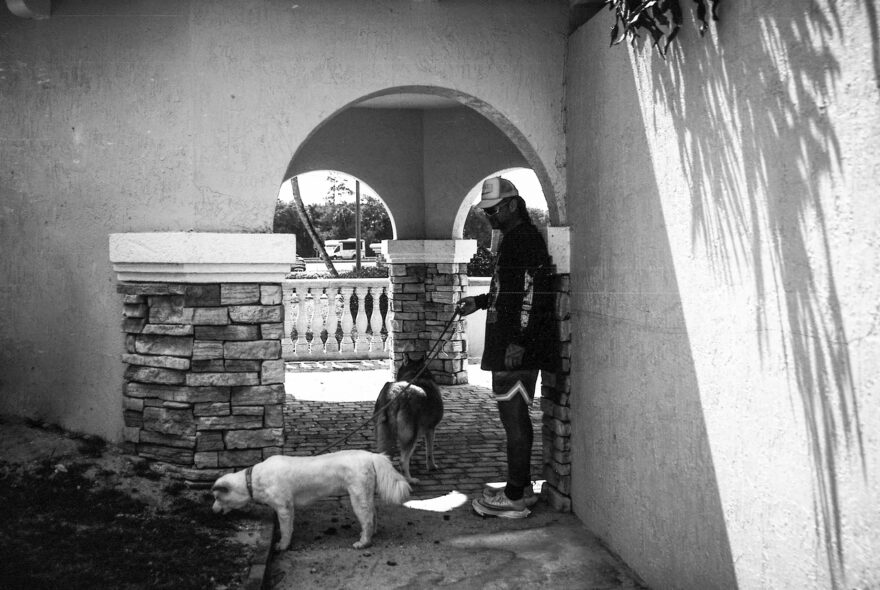
Photograph by Jessica Bellinger
As we pick up the pace to make it back to his crib in time for me to leave, a bunch of people without mullets watch us from their driveways. They’re used to seeing Riff and his dogs, but I still feel like we look like we’ve trespassed into this quiet gated community. One resident drives by slowly and stares at us like he’s the police. Riff waves back and gives him a big kill-them-with-kindness smile. The whole scene feels like it’s out of an MTV music video from the 1990s. A borderline extraterrestrial-like artist covered in tattoos with an outfit that nearly glows in the sunlight is walking his manicured dogs through a quintessential white-collar neighborhood with imported palm trees, manmade lakes, and guards in a gatehouse.
*
When I arrived four days ago, the first thing Riff said when he introduced himself was, “Damn, who gave you those? Crocodile Dundee?”
He pointed to my weathered boots, and we both laughed.
Then he introduced me to Holly and Frosty and asked if I was allergic to dogs.
I said no.
“It’s okay even if you were… because these aren’t dogs,” he said. “They’re my children.”
His living room has a tall chapel-like window that goes from the floor to the ceiling. There are neon chairs. Neon bikes. Neon art. Neon flip flops. It’s on brand for someone who called their first full length album Neon Icon. There is a giant speaker in the center of the room that plays music constantly. (When it wasn’t playing songs Riff showed me, it had the Prime Thanatos synthwave YouTube channel on a loop.)
Riff asked if I wanted to see the clothing store he’s opening in Delray Beach.
As we walked out of the house, he said goodbye to the dogs, and politely asked Frosty if she could get my bed ready in the spare bedroom.
*
Riff’s F-150 has neon pink rims and fuchsia seatbelts. The bed of the truck is lined with astroturf. You have to climb up into the truck which feels like a tank when we’re driving down the road.
He’s both driver and DJ. The first song he throws on is “Bad Dream” by Cannons and it makes the hot blue sky day seem slow motion and bittersweet. The contrast of the sad pop song against the immortal-looking beauty of Florida gives me that what-a-time-to-be-alive feeling, while also knowing it’s all going to end at some point—in an existential sense. (The song goes: “I been living in a bad, bad dream / I wish that somebody would wake me…”)
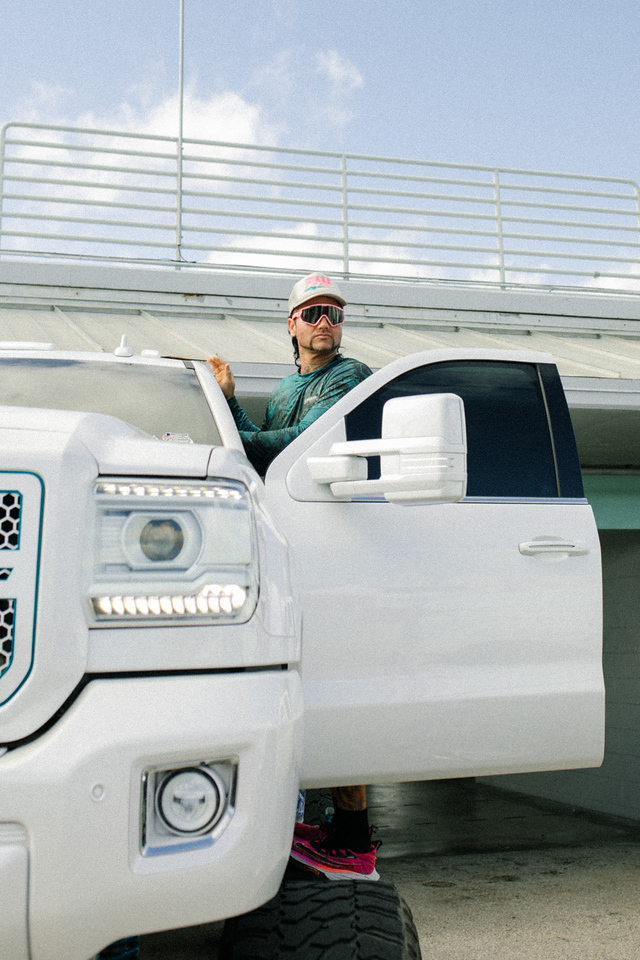
Photograph by Jessica Bellinger
Once we hit the highway, Riff started playing songs he has yet to release. When one ends, he turned to look at me and said, “That one sounds like it came from a Jean-Claude Van Damme movie that was unreleased and filmed in Panama… It was unreleased because they never got the permits…”
And, you know what, that’s exactly what it sounded like. He played a new song he did with Diplo. And then played an abrasive and menacing beat which samples the sound of a steel hammer hitting a train track.
Inside Riff’s store, we’re greeted by a mannequin wearing some of Riff’s old tour clothes and a pair of goggles.
Synthwave Sensai is there too. He and Riff talk about the possibility of throwing a show in the store—maybe something on the roof. Synthwave Sensai wrote the music for one of Riff’s newest tracks, “I Want a Ferrari,” that features Wiz Khalifa.
“Did you design all of this?” I asked, looking at the large collection of clothes on racks and in boxes.
“It’s all piled up over the last ten years. A lot of stuff I wore on tour,” he said.
It looks like there’s a thousand pieces of clothing, plus a ton of shoes. Some of the clothes he made or designed. Other stuff he collaborated on with others. There’s a leather jacket with the words: “WHAT’S HIGHER THAN A KING?”
Riff and Synthwave Sensai discuss the feng shui of the store. How much clothing will be on display at once. The music, the lights, the tint of the windows.
I’m pretty sure I overheard Riff say, “My second closet is a garage.”
Then he made a phone call. As soon as the person on the other end picked up, Riff asked, “Do you want to be in a band?”
I hear a “yeah.” And within fifteen minutes, the drummer arrived at the store with his family.
Riff asked how they find someone to play guitar. Someone suggested going out to the local clubs and scouting. Someone else suggested Craigslist, and we joked that Craigslist in Florida could be sketchier than normal. I told Riff maybe he should start a reality show like Making a Band (a reality show that Riff tried out for years ago.)
A father with two young children recognized Riff Raff outside the store. His kids actually noticed Riff first. I saw them ask their father to take a picture of them with Riff. He obliged and knelt down to smile for the photo.
Riff asked the kids what their favorite song was and without hesitation, the girl said, “How to be the Man,” from Neon Icon. (“Would go on vacation, but my whole life’s a weekend,” he raps on the track.)
Riff parked in front of his store’s entrance, jumped on the roof of his truck and spray painted his name in bright red above the doors.
The name Riff Raff was born on the basketball court when he was thirteen.
He used to practice at his high school’s court at night.
When some of the other parents watched him, they’d say, “Don’t come in here with all that riff raff.” While most others would practice passing the ball, he’d spend a lot of time dribbling the ball around like a Harlem Globetrotter.
Riff Raff became a nickname at first, but when he started to freestyle over beats, the nickname became the rap name.
His parents moved to Texas two years before he was born. His mother’s side of the family is Jewish, and his father’s side is Catholic. His maternal grandfather made money selling piping. He would drive up to construction sites in his Lincoln Continental, wearing a business suit, find the foreman, and offer the best price around. His tenacity brought him success.
Riff’s paternal grandparents had a farm, which his father got away from as soon as he could.
When his parents met in Arizona, they were living paycheck to paycheck. His mom’s parents saw that they were struggling financially, and offered them a guest house in Ohio. According to Riff, one day his maternal grandfather walked into the guest house and found Riff’s father doing drugs. His father wasn’t happy that his father-in-law could walk in on him at any time–and began to feel like he was living under someone’s thumb. So, his parents took off to Texas. From what Riff knows, his grandparents basically told his mom, ‘Good luck with that guy.’
Two years later, Riff was born. Not unlike his rap name, even his birth name seemed to have been created as a way to separate him from others. His father still held ill will towards his in-laws and wanted to ensure that his son would never inherit the family business. Riff thinks his father might’ve projected his own feelings onto his son—this desire to be free from the type of business world his mother’s father participated in. So, his father named him Horst Christian Simco. Perhaps because the name leaned heavily into his father’s Christian side—nearly forgoing any of his mother’s Jewish roots—Riff believes this helped to create a distance between him and his grandparents. He never really developed a relationship with them.
Riff told me he was raised going to church every Sunday and didn’t know all that much about his mother’s Jewish side until later.
“I’m not religious like that,” he said.
“You have a tattoo of a cross?” I asked.
“I believe in God. I believe in the miracle of life. I look at it like a phone. There is something greater than what we know. Someone put all these pieces in us,” he said, comparing God creating humans to the way Steve Jobs designed an iPhone.
*
When we were in line to order lunch at Chipotle, Riff told me that he went vegan after watching the movie, What the Health?
“Even if it was thousands of years ago, I wouldn’t eat animals,” he said. “I don’t care what time frame I was born in, I feel like I’d see the animals eating fruit and think, I’m good, I can survive off fruit too.”
“Salmon’s fucked up, too,” I said—referencing farm-raised Salmon, but also the way Fukishma messed up the Pacific.
“They put steroids in the fish,” he said. “They’re cutting fish with who knows what.”
“Like cocaine and baking soda,” I said. “I didn’t eat any meat for a long time, but I honestly don’t think I trust the plant-based burgers either,” I said. “But you feel good after switching up your diet?”
“I physically feel better,” he said, then touched his toes. “I couldn’t do that before… If you’re a Lambo and every once in a while, you put in unleaded, you’ll get fucked up. You gotta put that supreme gas in,” he said—as the woman behind the counter waited for our order.
“I wouldn’t want to kill animals or hurt them,” he said while ordering his meal.
We ate in the restaurant.
“So, are you totally independent right now?” I asked.
“I was almost mainstream with Diplo and then when I moved from Mad Decent [Diplo’s record label]… I went back underground.”
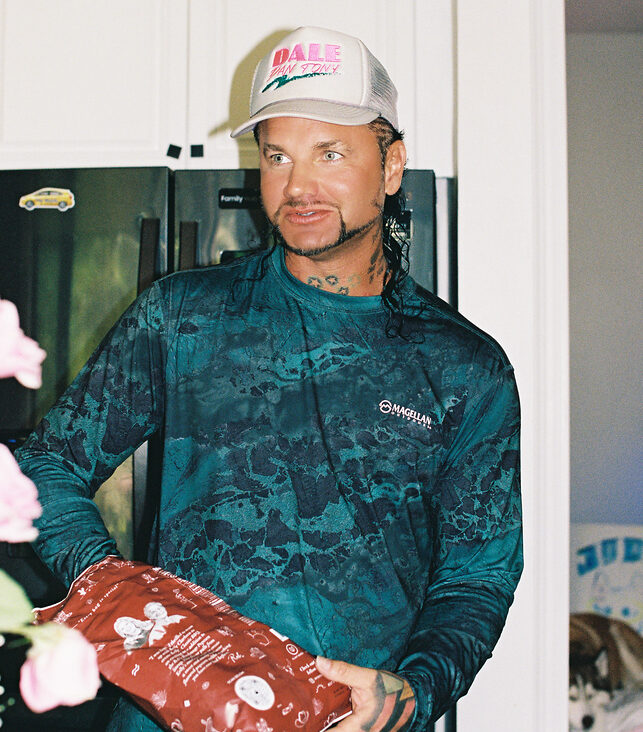
Photograph by Jessica Bellinger
His career hit turbulence in Australia in 2018.
A woman shared a social media post accusing Riff Raff of assaulting her on one of his previous tours through the county.
He told me that he’d toured Australia twice by that point and by the third time he had sold out shows. The woman started tagging all of the venues online accusing Riff of assault.
The whole thing still doesn’t make sense to him.
“The story’s still out there,” he said. “She said she went to a show of mine in 2013. Said she was backstage and that somebody came up to her and asked if she wanted some [cough] syrup and vodka. She said her boyfriend was there too. She said she took a shot and all she remembered is getting dragged to the car while her friends waved goodbye. And I guess the boyfriend just magically disappeared. Promoters cancelled the shows. All because the internet. Headlines literally said, ‘Riff Raff Cancelled.’ I called the police and asked if there was a report. I asked if I could go through customs. I said I’d rather go to jail and talk right now. But there were no reports. No warrants. Nothing. So, then I’m like hold on, I don’t want to cancel the shows.”
But every show was cancelled.
Riff said a few days after the accusations surfaced, people were hitting him up online and telling him that the same girl who put out that story about him was now performing at least one of the venues he was previously booked at. Supposedly, she performed spoken word poetry. He said he had other people telling him they got info that the woman and her former boyfriend were arguing about her accusations against Riff. Someone else told him that they know the woman personally and that she brags at parties about how she did this to Riff Raff. The thing is, whenever a fire like this is started on the internet, it’s nearly impossible to know who is and who isn’t telling the truth. From accusers to supporters, it all becomes an impossible distortion.
“I lost money, lost shows, lost sponsorships, lost friends,” Riff said. “It was immediate.”
“Public opinion is the new judge, jury, and executioner,” I said. “In 2017, you said something on Theo Von’s show that I thought was interesting. You said all people should be verified on social media. It’s funny to me now in retrospect because it seems like Elon bought Twitter to do something just like that. Why were you thinking that back then?” I asked.
“People make fake accounts and make false accusations,” he said. “It could be one person with fifteen fake accounts. If someone doesn’t like you, they can take those fifteen accounts and say, ‘Look, all those people agree with me.’”
On the way back to his house, he played a song where he sings “Everybody hates me.” His voice is so saturated in reverb that it sounds like he’s singing inside a cathedral. He said the beat is from 2012, but he recorded the vocals recently. I imagined him and his band performing this as an entire audience sings “Everybody hates me.”
I’m not sure if it was intentional or not after the conversation we had at Chipotle, but the song fit the mood and anyone who’s been chewed through the internet meat grinder knows the feeling.
We sit in the truck in his driveway while he played some beats Lex Luger made for him. Each beat has Luger’s brand of nightmarish and somewhat threatening tone that rattles the truck.
“Were there artists you heard beats from when you were younger that informed the way you pick beats now?” I asked.
“Back in Houston, I’d be looking for beats from Swishahouse. Or I’d hop on a JAY-Z beat.” He said he typically listens for certain tempos.
“If I’m gonna do rap, it’s gotta be dope raps,” he said—by which I take that to mean extremely tough beats with high-flying verses. I think of everything from “Bird on a Wire” to “Back from the Dead” to “Introducing the Icon.”
“You pick really specific beats that not a lot of people could typically rap on.” I tend to like a lot of the beats he chooses because they’re bizarre yet ecstatic—sometimes with haunting, nefarious synths.
“If I like a beat, I’ll know in ten seconds. If I can’t flow the second I hear it, it’s not good,” he said.
He played another beat that was sent to him from outside his camp. He’d been offered money to put a verse on it. After hearing what he’s said about knowing immediately if he likes a song or not, I can tell that this one’s not inspiring him. Typically, when I see him hear something he likes, words will start flowing.
“Beats-wise… I’m always involved,” he said.
Even when someone sends him a beat and he likes it, he will still add something to it.
“I need to pick the ingredients,” he said as instrumentals boomed from his truck speakers.
*
Once the sun went down, the inside of Riff’s house began to glow. There are studio lights giving off a Close Encounters of the Third Kind spaceship hue. His dogs are napping in a pink princess bed next to some of the synths in the studio.
We started drinking whiskey seltzers and Riff played more songs from Sapphire Stallion.
It’s hard to place where songs like this would wind up on the radio or playlists on streaming services. Now that the concept of genre has been totally obliterated, I could potentially see these songs on rap stations, pop stations, and perhaps even some country stations. It’s not that Riff sounds like he’s attempting to morph himself into these genres though. It’s that the new songs sound like an authentic mutation from where his music was already heading.
I told him that the first song I ever heard from him was “Now They Mad,” and in a way that seems like a very early version of what he’s doing on Sapphire.
He said this is the direction he wants to go in.
“I’m a musician, not a rapper,” he told me. He seemed interested in changing people’s perception of him. I think some people view him as a person playing a character who happens to rap. But I believe this is who he always was—aside from money and fame, he still seems like the kid passing out demos at the mall in Houston. He’s just turned the internet into the mall now.
He said he’s not interested in trends. He’s interested in being the trend.
“I understand that rap, above every other genre, is the most expensive sport in the world,” he said.
He said all this then played one of the hardest rap songs I’d ever heard from him. It featured Dollabillgates who is also on “Watermelon Wiseguys.”
At some point after the whiskey seltzers and some tequila, I stumbled up the red carpeted stairs, past the statue of a polar bear, and into my bedroom where the sheets were camouflage print. They looked like something Riff would have in one of his videos with Yelawolf.
*
In the morning, there were men mowing every lawn in the neighborhood. One guy knelt in the grass outside Riff’s place chopping a coconut in half with a machete. He’d made a pile of coconuts from the palm trees.
Riff and I watched the guy effortlessly split the coconuts.
“You’ll see three dudes laying on the sidewalk feet kicked up on a cooler barefoot and just walk right over them and say, ‘Hi, good morning,’” Riff said. “They’re working hard… They’re not out here taking naps.”
I wouldn’t say we were hungover, but we were feeling the whiskey seltzers from last night.
We stood around the kitchen waiting for the coffee to brew.
Riff said his eyes felt heavy.
“Eyes heavy,” he muttered. He repeated the phrase twice then said, “Eyes heavy… Spaghetti… Armageddon”—as if taking the words for a test drive to see how they sounded together.
“Do you remember when you really started to think about writing—in the way you do. Not everyone can rap a bar like: ‘I’d rather run through the rain than to ask you to borrow an umbrella / I don’t fly in helicopters / I don’t trust the propellers / I don’t trust the way they spin’ and get away with it like the way I think you can on a song such as ‘Watermelon Wiseguys,’” I said.
I think he thought maybe I was just surprised that someone would think to string those words together on a rap song, but he assured me: “I don’t trust propellers, and I don’t trust helicopters.”
He almost didn’t want to answer my question about writing—either because it was too early to get into this topic, or he didn’t want to have to try and deconstruct his process.
But I was genuinely curious. He has called himself Edgar Allan Poe in a turtleneck.
“Were you reading certain things when you were young?”
“My dad would listen to this radio show,” he said. “Hearts of Space. It was just audio, but it sounded like a movie score.”
Riff would listen along and imagine an entire storyline based on the sounds.
He also recalled the way specific words would stand out to him as a kid.
“Oh, that’s extravagant. Oh, that’s extraordinary. Maybe other people picked up on words like that too when they were kids, but I always kept it in mind.”
“Did your father talk about war?” I asked. Riff’s dad had fought in Vietnam.
“He didn’t really talk about it that much. He didn’t want to tell his kids that type of stuff… He tried to keep that away from us. Then when we got older, we realized he’s having flashbacks, then he’s in the hospital. He talked to counselors about that, not to his kids,” he said.
His father would later die of cancer.
“My dad stopped smoking cigarettes,” Riff said. “But later on, he decided he’s gonna smoke again…” He stops to think about his father passing away. “I probably shouldn’t smoke weed,” he said.
I told him what my grandfather used to say about knowing one person that lived for eighty years and they smoked, and drank, and partied the whole time—with no problems. Then he’d say he had another friend who ate right, exercised, did all the healthy things, and they died young.
“You just never know… My husky, Jody, had a good life. Ate good food. Comfortable. Jody was only seven…” Riff said, referencing his dog that was featured on the cover of Neon Icon who has since passed away.
There are rarely glimpses of genuine sadness in his songs, but there was a line I heard him rap last night about Jody that was also tragic. I don’t think he likes talking about sad things, and I don’t blame him. I’m typically the opposite—but then again, I’m the one dressed in all black and he’s neon. But I will say that I think he thinks about this stuff more often that one might expect. I think it’s possible he’s built a world of joy around him as a kind of armor against a lot of the darker things he’s witnessed—whether it’s losing his father or losing friends.
Later, I noticed the tattoo of a Chinese takeout box on his arm. I’d heard he got the tattoo with Lil Peep—a young rapper who passed away a few years back.
“You and Peep were close?” I asked, pointing at the tattoo.
“We got these three days before he died,” he said.
Riff pulled up Lil Peep’s Instagram account on his phone.
“Here’s me and him. This is in Dallas Forth Worth. I had a show, and he had a show.” Riff looked up another post on Peep’s page.
It’s a video of Peep singing something off the top of his head—addressed to Riff.
“I woke up, and I miss my uncle, my good ol’ uncle Riff, I said we need a mixtape, he said let’s do that shit…”
“I should use that for a song,” Riff said with an air of regret—the two had planned to collaborate before Peep passed away. He was one of those promising artists that rose to fame quick and died tragically way too young.
We took the dogs for a walk. I hadn’t seen one cloud since I’d been down here.
“Top of the morning to ya,” Riff said to a neighbor.
This neighbor had yet to meet Riff and introduced herself. Riff introduced himself as Jody. Then he introduced the dogs—along with some of their aliases they have such as Jupiter and Yardi B.
The mail that arrives to Riff’s house is addressed to all of his various aliases. There are boxes for Riff Raff, Jody Highroller, Dale Dan Tony, and even his legal name Horst Simco.
“Why’d you move to Florida?” I asked.
He threw his hands in the air as if to say look at this place.
He said, “It’s paradise… look around.”
*
Riff was asked if he wanted to visit a Monster Truck rally at a racetrack near Miami.
Whomever was throwing the event had asked if Riff wanted to judge the bikini contest. I don’t know for sure, but I get the feeling Riff might’ve stalled our departure so he wouldn’t feel bad for saying no. He took nearly an hour just to make sure Holly and Frosty would be OK while we were gone.
I asked why he wasn’t going to bring them, and he said they might eat someone.
Instead, we stood around the kitchen watching Riff run through a sketch about what it would be like having to judge a bikini contest without having to hurt anyone’s feelings.
“Alright, everyone wins,” he said with a sports announcer’s voice—he held an imaginary microphone. “You’re welcome,” he announced to the imaginary contestants. Without hesitation, he then acted out the role of some of the confused contestants as well as the audience and then back to the judge.
When we arrived at the truck rally, we saw some of the trucks that were featured in his music video for “Ain’t Giving Up My Truck.” One of the trucks had driven to Florida from Kansas to be in the video. It’s a giant white neon pink and green custom truck. Riff Raff’s name was painted across the bottom.
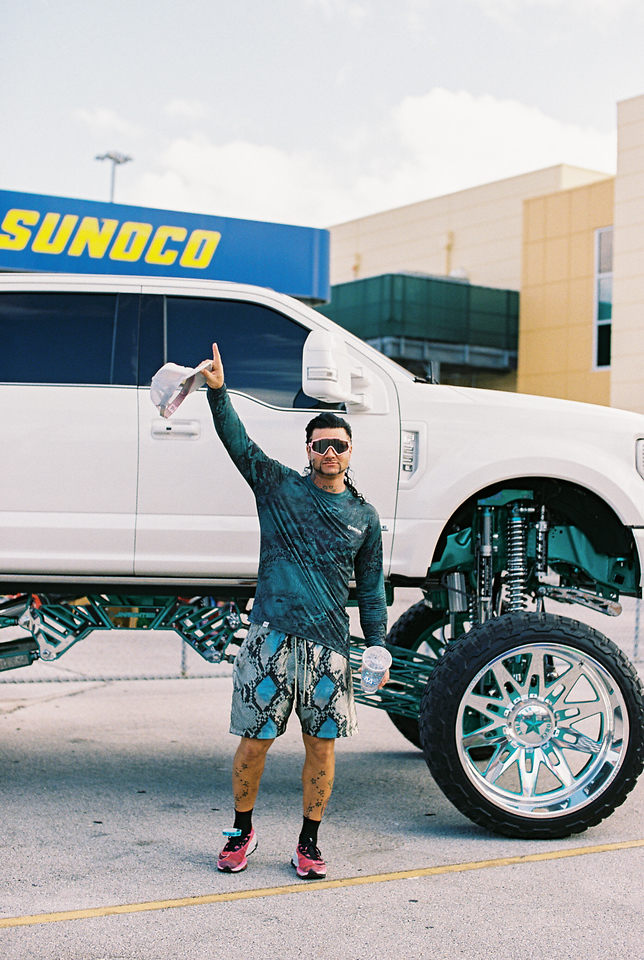
Photograph by Jessica Bellinger
The moment we started to walk around, people leapt out of trucks and golf carts to take a photo with Riff. One dude saw Riff and jumped out of his shoes while he was driving a golf cart to get a picture.
Everywhere we went, people called out to him using his various aliases.
Riff took his time with everyone who asked for a picture.
As we looked at some giant truck tires that cost $15,000 a piece, I told him it must be strange and thrilling and maybe even delirious at times to be hounded in public. He told me it was all good, but he wished more people would yell out song names or lyrics. He knows he’s become something of a household name, but I think this is where his focus has shifted into making his art as recognizable as he is.
If, like he said, he’s gone underground then the whole world’s gone underground because everywhere we’ve gone this weekend—whether it was Wal-Mart or a random parking lot or sitting at a red light or at a racetrack—people recognized him and wanted to say what’s up.
When it started to get dark, there was what they call a truck pull—which is where monster trucks back up bumper to bumper, chained themselves together, and play tug-of-war.
The whole scene reminds me now, in retrospect, of something I would later read in Riff Raff’s book of poems, Neon Vibes.
“WE HAVE BEEN BOMBARDED / WiTH AN iMAGiNARY / COMPETITION THAT iS iMPOSSIBLE TO WiN”
I couldn’t tell if Riff was enjoying himself. He watched everything closely—made remarks about each of the trucks—and laughed when the giant plumber’s truck actually broke one of the monster trucks during the contest. But it seemed like his thoughts were elsewhere. I imagine it’s tiring being in public when you’re a public figure—as thrilling as fame might be, it also looked draining. I don’t think he let anyone who came up to him see that he might’ve been tuned out a little, but as soon as they’d walked away with their photo with Riff, he’d sort of recede back into his thoughts.
He watched the crowd the way I’d imagine a curious extraterrestrial would walk amongst us—trying to understand what the fuck it means to be a human being. Celebrities essentially become a kind of extraterrestrial. We share a planet—but their reality is vastly different.
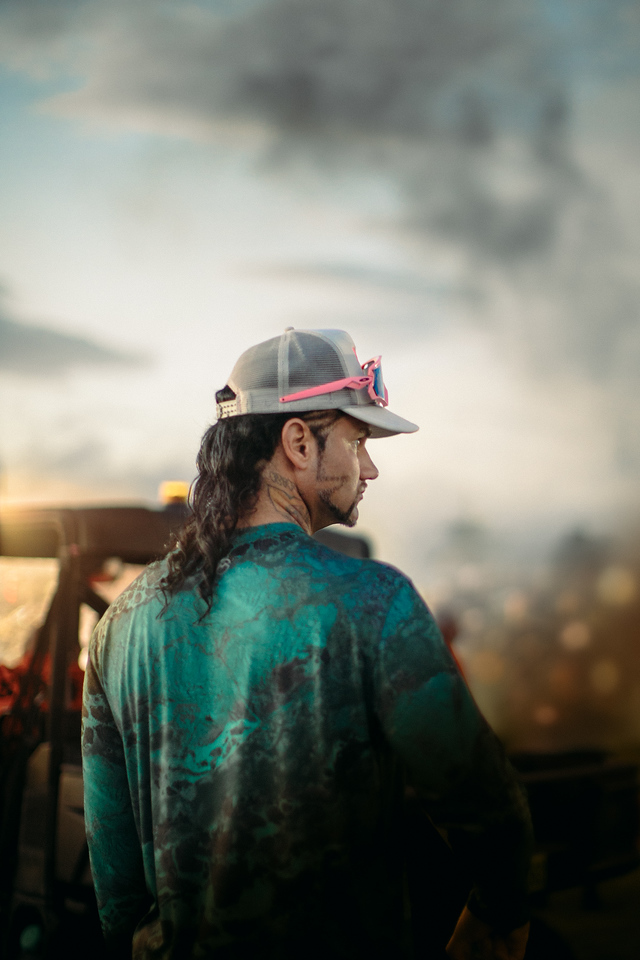
Photograph by Jessica Bellinger
One byproduct of the internet is that fame has been accelerated yet also fractured that there can be extremely famous people in specific niches that would be totally unknown somewhere else. To be honest, I was not expecting to see Riff get bombarded in public to this degree.
At some point, someone came up to us and said they had an extra Air BnB that we could use if Riff was interested. No one was going to be there.
When we punched the code into the front door of the house somewhere in Miami, Riff immediately toured the place. He opened every door and turned on every light as if he was a realtor scoping out a new listing. He walked back out into the living room and reported back to us, “It’s a nice little two-bedroom fuck-around-house.”
I don’t think any of us had any idea why we were there. But we chilled for a bit, drank some bad coffee, talked about gas station architecture, and decided to head back to Riff’s. (For the record, Riff thinks the design of RaceTrac gas stations could have a pool on the roof. “Closer to the sun. And closer to God,” he said.)
*
When we got back to Riff’s, he vanished into the night.
The photographer I brought with me to take photos of Riff was heading out when she happened across him sitting on the ground using a leaf to help a frog cross the street.
When he finally returned, he wanted to hear the beat that someone was paying him to put a verse on. He seemed ready to record.
After listening to the beat a few times through, Riff said he wanted to hear some of the new songs that Synthwave Sensai had been working on.
The moment he heard a new up-tempo beat, he was instantly engaged and started humming a melody.
It seemed like he’d freed himself from the thought of trying to force a verse on the one beat, and now was eager for something new.
Riff made us all dumplings as he freestyled ideas over Synthwave’s beat.
“No I not,” he repeated over the music.
“No I not” was part of an inside joke he and Synthwave Sensai and Mychael had been using all weekend.
“They thought my album about to drop… no I not… You thought I stole your dad’s yacht… no I not.”
As funny as it was, it was also extremely catchy.
After hearing it a few times, all three of us were in the kitchen singing “no I not…”
I thought that this “No I Not” anthem would’ve been the highlight of the night, but Riff was just getting started. He was animated now. After listening to that for about fifteen or twenty minutes, Riff said he wanted to come back to this song later and hear more new beats.
Synthwave Sensai played another song that starts with a bright synth chord and a thumping ‘80s style bass, upbeat high hat, and a wavy guitar riff that floats over the track.
Riff immediately started writing lyrics on his phone.
I took a seat behind Synthwave Sensai. This part of the studio has Barbara Streisand’s Memories and A Star is Born on vinyl. There’s a Fender Rhodes. A Gretch guitar. A Moog. Some keyboards stacked on a stand. And Frosty and Holly’s little pink princess bed.
There were some balloons floating in the living room beside Riff as he wrote.
There’s a Game Genie in his studio amongst the keyboards as if it was just another instrument. It’s another one of those stabs of nostalgia that Riff seems so interested in—whether it’s a Ninja Turtles shirt or a Saved by the Bell reference. They act as reminders of the freedom of joy in childhood. Before the routine of adult life kicks in. I think one of his goals, especially with music, is to remind people that life can be fun—no matter how bad it can get. The Game Genie, not unlike the synthesizers, holds some type of cheat code to help hijack the algorithm—with just the right sequence of notes and rhythms.
He wrote lyrics for approximately half an hour and by 3:50 a.m. he was in the booth.
“Aight, let’s go,” I heard him say through the monitor on Synthwave Sensai’s console.
The first half of the song is one big verse and the second half is a long hook where he sings about neon in Hong Kong.
After a few run throughs, he tried punching in different takes.
“Erase all that,” Riff said.
He told us he’s going to do it in one take—and then he did. The song is done before 4:30 a.m. He’s already layered his vocals for the hook and threw in some ad-libs.
We listened to the track a bunch of times afterward.
I told him that it might be my favorite song of his yet, and I sincerely meant it.
He looked at me and without any hesitation said, “It’s already big in Hong Kong,” despite the fact that only three people in the entire world had heard it so far.
*
By my last day on Planet Riff Raff, I realized that I’ve hardly slept. Not because my accommodations were uncomfortable, but because I didn’t want to miss out on any of the work Riff is up to. He’s not kidding when he says things like, “funny in the day, work at night.” It’s a constant grind and sometimes he punches in at midnight to start work. He exists in his own time zone. He sustains a momentum that’s lightspeed. And if you aren’t paying attention, he’s already ten new ideas ahead of the last one he told you about.
Despite having gone to bed just a few hours ago, we were all up early, and Riff had already added a few extra layers of vocals to the hook at the end of the new song and lifted weights while watching Hasbulla drive a bus with giant wheels through the desert in Las Vegas. It was the first time I’d actually seen the TV used for anything other than streaming songs.
We took the dogs for one last walk before I had to catch my flight home.
As an artist, I think Riff’s music has been one of the last great examples of escapist art. It seems purposefully detached. It’s rare to see an artist’s music stay unplugged from current events—especially these days in hyper-information overdose-land .
When I bring this idea up to him about not allowing the filthiness of culture war stuff to seep into his songs, he said: “I just change the channel.”
But I also wonder how long even he can withstand the nature of reality that feels like the walls keep closing in on us.
We walked past the spot where Riff told me he wanted to film a music video.
It’s a manmade hill of manicured grass that rises above a white wall. His idea is to stand on the wall as he sings one of his new songs called “Blue Jay. ”
“Remember that video?” he asked and started singing Blind Melon’s “No Rain.” He said he’s taking inspiration from that song’s music video.
“Are you happy?” I asked him. “Without yet reaching that next level of success that you’re focused on?”
“No,” he said. I almost joked and said, “No I not,” but I wanted to stay serious because I’m interested in how someone who’s gained success views the path to even higher success.
For him, the idea of achieving new levels means that all of his ideas can be translated purely from his imagination into this reality. Even with the success that he has achieved, a lot of it as an independent artist, he wants to be able to have even less hurdles between his ideas and the audience. No matter how wild or surreal or extravagant they might be. I believe this encompasses everything from TV, film, podcasts, music, and fashion.
“I refuse to go in reverse,” he said. “It’s like the guy who goes on a diet. He’s working out and then someone asks him if he wants a cheeseburger and he eats it because, ‘Well, someone gave it to me.’”
“It’s a hustle no matter what level you’re at,” I said. “I get it. To me, you seem wildly famous, but when I hear you talk about needing to get to that next level, it reminds me of how it must’ve felt for you when you were passing out those demos at malls in Houston and using Myspace to promote—now you’re trying to hijack the algorithm with the tools we have today.”
“I’m a household name around the world, but that doesn’t necessarily turn into more money,” he said.
It’s interesting to think about the relativity of fame and success. To most of us, Riff seems like he’s got the world at his disposal. Giant truck, giant house, hit songs. But he’s been in situations where he has seen what else this world has to offer.
He talked about going to Drake’s house in Calabasas. There were chefs, Drake’s mom’s friends were hanging around, bartender at the pool. When Riff mentioned this, I realized that outside of wanting more success to generate even more money to build his imagination in real life, he also wants to get to that next level so that he can allow his friends and family to chill just as much.
“I don’t think many major labels these days understand artists that move as differently as you do… You can hop on a song with Dirst Nasty [Simon Rex] and Andy Milonakis—and then collaborate with someone like E-40 or Wiz Khalifa.
“It doesn’t matter,” he said. “The internet is a smoothie. You could have the perfect ingredients for a smoothie. Ice cream, fruit, all that—and if you throw one little piece of shit in there it fucks the whole thing up.”
I believe he’s referring to what went down in Australia. It’s strange to think that Riff has been sort of ostracized by major labels, so far as I can tell, without the same kind of chances extended to other artists who’ve actually been proven to do something verifiably bad.
But nothing is going to stop him from working.
“I think a lot of people are just afraid to take risks,” I said.
“Especially in today’s culture,” he said.
“People think culture is what everyone else is doing,” I said. “Real groundbreaking culture, to me, is what the general public doesn’t even know about yet… It’s the stuff that gets dismissed at first, but then becomes the thing everyone else wants to imitate,” I said. “And in terms of major labels, I don’t see them as nearly as viable as they used to be.”
I could see someone like Riff doing something like what Radiohead or Nine Inch Nails or Tom MacDonald or Jack White have done. Subvert the major record industry as we know it.
As soon as he told me he wanted to show me the video for the Sapphire Stallion song “Cosmic Love,” Holly and Frosty’s ears perked up. There was a dog across the street—walking in our direction. Holly lunged forward. Then Frosty. Riff pulled back on the neon green leash.
“They’re gonna try to eat those dogs,” Riff said. “Gotta run….” And the three of them sprinted up the street in a blur of neon.
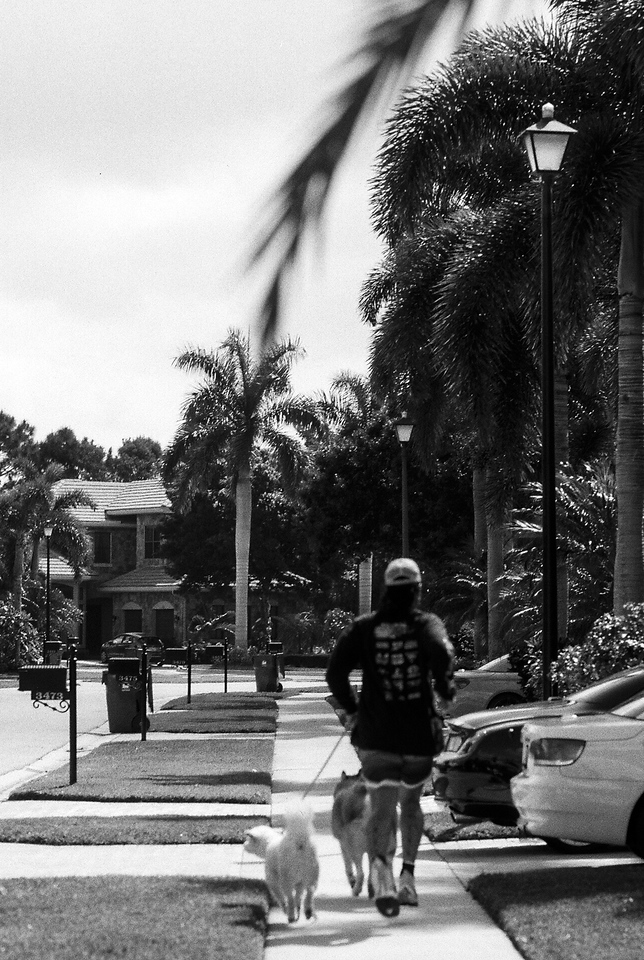
Photograph by Jessica Bellinger
